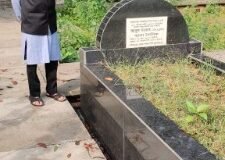 BY MUHAMMAD ZAMIR :: Six weeks have passed and yet violence continues to rage on in the name of achieving democracy for the common man. On the plea of recovering the inherent and inalienable rights of the people, the 20-Party coalition led by the BNP continues to foment arson and unrest. Non-stop blockade and hartal have not only disrupted the life of citizens but also torn apart connectivity between different parts of the country.
BY MUHAMMAD ZAMIR :: Six weeks have passed and yet violence continues to rage on in the name of achieving democracy for the common man. On the plea of recovering the inherent and inalienable rights of the people, the 20-Party coalition led by the BNP continues to foment arson and unrest. Non-stop blockade and hartal have not only disrupted the life of citizens but also torn apart connectivity between different parts of the country.
It has also led to more than 80 deaths, nearly all of them from severe burn injuries resulting out of ‘cocktail’ and petrol-bomb attacks on transport vehicles- buses carrying passengers not involved in any way with politics and cars with family members coming to Dhaka from different parts of the country after their winter vacation. There have also been attacks on persons travelling by railway by derailing train lines (by opening clips and fish plates that hold train lines to the ground) and also in launches (by setting on fire parts of the cabin) on river routes. Fortunately, the attempted arson activities carried out on river boats was not successful. Trucks carrying food grains, agricultural produce and items meant for export have also been targeted and the contents destroyed.
The BNP leadership has continued to claim that their activities are peaceful and that they are not resorting to any form of militancy or attacks against civilians. Instead, they are complaining that their ‘peaceful’ protests are directed against the government’s actions against the 20- Party activists in the form of unjustified arrests and extra-judicial killing. They are also now claiming that some of the arson incidents were undertaken by Awami League supporters.
Different media formats- both electronic and print- have been following the bloodshed with great care. They have published compilation of data on the on-going violence. According to them 906 vehicles have been attacked and destroyed and that there were still 111 persons receiving treatment in hospitals due to severe burns (more than 500 other persons including women and children have also received treatment for their burn injuries and had then been allowed to return to their homes).
Media has also revealed that according to their information the on-going blockade and hartal had, till, 6 February caused a total estimated loss of more than Taka 75,000 crore to the economy (the sectors covered in this computation included Ready Made Garments and Textile, Transport, Agriculture, Tourism, Housing and construction, trading carried out by petty shop-keepers and small entrepreneurs, Ceramic and Poultry). It is understood that the government’s law and order agencies have been trying to provide some security to vehicles. However their efforts appear to have been less than sufficient, particularly during the night on highways. A classic case in point has been the terrible attack on a bus travelling through Chouddogram at 3 am at night. An attack of petrol bombs resulted in the immediate death of seven passengers, which included two members of a family returning home after a winter holiday in Cox’s Bazar. Quite a few of the other passengers are still receiving treatment in different hospitals.
Some of the survivors of such attacks have revealed to the police that the petrol bombs in most cases are being hurled into vehicles by young men who carry out their attacks in the darkness by running out from hidden positions on the sides of roads. Some of these arsonists and assailants have been captured on camera by the media but few amongst them have actually been arrested. A few who have been taken to custody have confessed that they are mostly unemployed and were hired to carry out these attacks. The media have also reported that the police have at times been able to arrest a few belonging to the 20-Party coalition with their stockpile of unfinished bombs and other incendiary materials. Such seizures have taken place in police swoops in several places in Hathazari in Chittagong and in Dhaka.
Evidence suggests that such arson attacks are now being outsourced by some Opposition political parties. This is taking place while their activists are staying behind in the shadows. What a travesty of ethical values! These terrorist activities in the name of democracy remind me of late Justice Kayani’s famous observation made during the time of President Ayub Khan about fifty years ago. He said democracy for some is defined as “buy the people, far the people and off the people”. Some of our Opposition political parties appear to have forgotten democracy and democratic practices as followed by Abraham Lincoln. They should remember that blockades can be achieved through picketing in a peaceful manner. I may sound naive but making a point should not mean destroying economic livelihood of millions, killing innocent civilians at random- acts which are against human rights and Islamic tenets.
One thing is very clear. Intermittent hartals are having a serious impact on our economy and our prospects for development. The Finance Minister, an instinctive optimist, has been forced to reveal that the current situation will reduce the chance of the country achieving the targeted 7.3 per cent growth. It may be recalled that the World Bank and the IMF had earlier forecast a growth of around 6.2 per cent, the Asian Development Bank around 6.4 per cent and the Bangladesh bank slightly above 6.5 per cent. All these forecasts are now in jeopardy.
Such a prospective is indeed most disappointing. We have over the last few years been able to move forward, better than other countries in South Asia in the achieving of the Millennium Development Goals. Hope had risen that if the country could continue its pace of growth as reflected in 2013-14, we might be able to achieve middle income status by 2021.
Trade and business bodies are seriously worried about the evolving developments and destructive activities and have pointed out that “bombings, arson attacks, violence and killings do not go with politics”. They have also observed that “these should be stopped first. Then only we can go somewhere with a proposal, if any”. One understands that the business community wants the President and the prime Minister to undertake a constructive engagement.
We need to understand that things are really quite serious. On 5 February it was reported that our earning from export despite all the disruptions have increased by nearly 5 per cent to US$ 2.88 billion in turmoil-hit January compared to the same month last year. The manufacturers and exporters have however indicated their fear of negative growth in the upcoming months. They are not receiving the expected orders from the buyers due to the political unrest.
The BGMEA leadership have mentioned that there had been an increase in orders after buyers were satisfied with our improved safety standards after the Tazreen and Rana Plaza fiasco. They are now hesitating once again because of the political uncertainties. The leading brands that have highlighted their concern include Walmart, Gap, JC Penney, C&A, Tesco, G-Star, H&M, Target, Inditex and Carrefour. Local manufacturers have tried to restore confidence among the buyers by sending their representatives to the offices of these buyers in Hong Kong, China, Thailand, India and European countries. If, despite their efforts, the concern lingers on, there is a possibility that these buyers might divert their orders elsewhere.
Another case in point has been the emerging ceramic industry which employs nearly half-a-million people. That is presently in the doldrums. A total of 54 companies have invested over Taka 5,300 crore in the recent past in this industry. Many of them had plans for further expansion, given the existing bright prospects in this sector. Now they have decided to hold back expansion. Some among them have halted production because of shortage of raw materials. In any given situation of turmoil one seeks the beacon of light at the end of the dark tunnel. Even that possibility is being put to the sword with this wretched approach by the 20-Party with regard to education and the holding of examinations. One has watched with dismay the dismal situation that evolved for the thousands of students who missed out in taking their ‘O’ level and ‘A’ level examinations at the appointed time. They have now lost six months of their young career.
In similar terms we have watched the manner in which more than 1.5 million students taking the SSC and equivalent level examinations are facing terrible uncertainties. How can political parties claiming to be supporters of democracy inflict such pain on our younger generation?
Parties which are expected to be concerned, they need to realize that creating anarchy and generating terror cannot be the catalyst for convening a dialogue about the future of the political process.
Hartals and blockades have to be called off before they lose control over those to whom they have outsourced such heinous violent activities. This deteriorating scenario might then eventually lead to extreme forms of terrorism which does not recognize accountable and responsible democratic governance.
The government also needs to provide more soft space to the registered political parties and initiate an inter-active engagement with them once they have foresworn violence as their code of conduct.
The writer, a former ambassador, is an analyst specialised in foreign affairs, right to information and good governance.
He can be reached at mzamir@dhaka.net
 Weekly Bangla Mirror | Bangla Mirror, Bangladeshi news in UK, bangla mirror news
Weekly Bangla Mirror | Bangla Mirror, Bangladeshi news in UK, bangla mirror news




